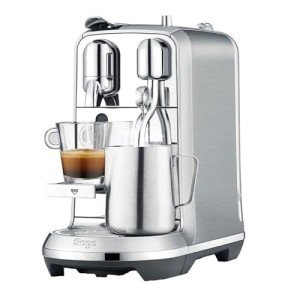The World of High-Quality Espresso Machines: A Comprehensive Guide
Espresso has actually ended up being a cherished beverage amongst coffee lovers worldwide, understood for its rich flavor, intense aroma, and flexibility. The heart of a great espresso depends on the machine used to brew it. High-quality espresso machines are developed to deliver the best shot, making them a vital investment for coffee fans. This post checks out various kinds of high-quality espresso machines, their functions, upkeep tips, and responses to often asked concerns.
Kinds Of High-Quality Espresso Machines
High-quality espresso machines fall into several classifications, catering to various preferences, ability levels, and budgets. The main types consist of:
| Type of Machine | Description | Ideal User |
|---|---|---|
| Manual Espresso Machines | Requires user skill to manage extraction and pressure. Uses the most control over the brewing process. | Experienced baristas and lovers |
| Semi-Automatic Machines | Combines manual operation with automation. Users manage the grind and tamping, while the machine manages water dispersion. | Intermediate users |
| Automatic Espresso Machines | Automate the developing process, allowing for programmable brewing times and temperature levels. | Casual coffee drinkers |
| Super-Automatic Machines | Have built-in mills and are fully automated, dealing with everything from grinding to brewing and steaming. | Users seeking benefit |
| Commercial Espresso Machines | Developed for high volume use in cafes and restaurants, providing resilience and speed. | Company owner |
Detailed Overview of Each Type
- Pros: Complete control over the brewing process; can produce remarkable quality espresso.
- Cons: Requires significant ability; lengthy.
Semi-Automatic Machines
- Pros: Balanced control, blending manual and automatic procedures; superior quality espresso is still achievable.
- Cons: Requires some understanding and experience to master.
Automatic Espresso Machines
- Pros: User-friendly; minimizes the discovering curve while still producing high-quality espresso.
- Cons: Still requires some understanding of coffee-making essentials.
Super-Automatic Machines
- Pros: Maximal benefit; little ability required; perfect for individuals or families who want coffee without hassle.
- Cons: Higher price point; may do not have the fine-tuning capabilities of manual machines.
Commercial Espresso Machines
- Pros: Built for durability and performance; often includes functions for high-volume turns.
- Cons: Expensive; may be overkill for home use.
Key Features to Consider
When looking for a high-quality espresso machine, numerous crucial functions should be considered:
- Pressure and Pump Type: Look for machines with at least 9 bars of pressure, which is vital for extracting the very best flavor from coffee beans.
- Boiler Type: Single, double, and heat exchanger boilers each affect how the machine carries out and the speed of developing.
- Develop Quality: High-quality products such as stainless-steel are preferable for toughness and looks.
- Ease of Use and Cleaning: Some machines need extensive cleaning, while others are developed for easy maintenance.
- Temperature Control: Consistent temperature is crucial; consider machines with PID controllers for accurate control.
Advantages of High-Quality Espresso Machines
Purchasing a high-quality espresso machine offers a plethora of advantages:
- Superior Quality: High-end machines permit for higher control, resulting in tastier espresso.
- Sturdiness: Built to last, quality machines need fewer repairs and replacements.
- Modification: Users can delight in a customized experience by changing grind size, shot timing, and other settings.
- Increased Convenience: Automatic and super-automatic options allow fanatics to delight in espresso with minimal effort.
Maintenance and Care for High-Quality Espresso Machines
To keep an espresso machine operating efficiently, regular maintenance is vital. Here are suggestions for maintaining a high-quality espresso machine:
Descale Regularly:
- Use a descaling service every couple of months to prevent accumulation of minerals from water, which can impact flavor and efficiency.
Tidy the Brew Group:
- For machines with a detachable brew group, clean it frequently to make sure a clean extraction.
Replace Water Filters:
- Use a water filter and alter it as required to reduce pollutants in your brewing water.
Daily Cleanings:
- Rinse the portafilter and group head after each use to avoid oil buildup.
Keep an Eye on the Parts:
- Monitor seals, gaskets, and other parts for wear and tear and change them as necessary.
Regularly Asked Questions (FAQs)
1. What is the very best espresso machine for newbies?
For novices, a semi-automatic machine often offers a great balance of functionality and control, allowing users to learn the skills required for making terrific espresso.
2. Are super-automatic machines worth the investment?
Yes, for those who prioritize convenience and ease over control, super-automatic machines can be a deserving investment, specifically for households or busy specialists.
3. Just how much should I anticipate to invest on a high-quality espresso machine?
High-quality espresso machines vary significantly in rate, with manual machines beginning at a few hundred dollars, while super-automatic or commercial machines can surpass several thousand.
4. Can I make other coffee drinks with an espresso machine?
Yes, many espresso machines have steam wands or attachments that enable users to develop lattes, cappuccinos, and more.
5. The length of time do espresso machines normally last?
With correct upkeep, high-quality espresso machines can last over a decade, making them a long-lasting financial investment in your coffee pleasure.
High-quality espresso machines yield a transformative coffee experience, whether enjoyed in your home or in a commercial setting. By understanding the types offered, their functions, and the maintenance required to keep them running effectively, customers can make informed decisions that raise their coffee-drinking experience.

